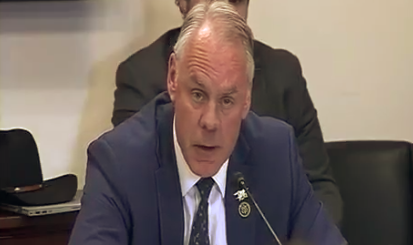
- Details
- By Levi Rickert
WASHINGTON — Interior Secretary Deb Haaland (Laguna Pueblo) was on Capitol Hill Tuesday to defend the Biden administration’s $18.9 billion 2024 budget request for the agency that manages most federal lands, natural resources and programs for Native Americans.
The President is asking for a nearly $2 billion increase for the Interior's budget next year.
While Haaland traveled to the House Interior, Environment Appropriations Subcommittee to talk about the budget, Rep. Ryan Zinke (R-MT) wanted to talk to her about the Interior Department’s current stance on policies he supported as Interior Secretary during the Trump administration.
Zinke, who held the position for less than two years before resigning under pressure, used his allotted time to grill Haaland on the Interior shift in mining policies that he had supported at Interior. He also questioned Haaland about her recent decision to withdraw a land exchange in Alaska between the Interior Department and King Cove Corporation that was signed by his successor, Interior Secretary David Bernhardt, in July 2019.
After the hearing, in an apparent effort to extend an olive branch, Zinke told Haaland: "I may wear a hat but it's not cowboys and Indians, I hope you know that."
Haaland laughed.
Zinke later accused Haaland of not being able to answer his questions. His congressional office posted on its website the following exchange:
ZINKE: Are you aware that China produces more emissions than any other country on the planet?
HAALAND: I probably read that somewhere,
ZINKE: Are you aware that China produces 90% of plastic from four rivers?
HAALAND: I’ll take that to be true.
ZINKE: Are you aware that by multiple studies, that in order to satisfy the present requirement of EV and critical minerals, it would take an increase of 2,000% in minerals needed in the next twenty years?
HAALAND: Thank you for that information.
ZINKE: Are you aware that Northern Minnesota is home to those critical minerals?
HAALAND: I am not sure.
ZINKE: Can you pick any place in the United States that you’ve identified to fast-track so we are not vulnerable to China and Russia both In defense and EV?
HAALAND: We are working on identifying those critical minerals.
ZINKE: You would agree that not having the critical minerals identified and produced in this country is a security problem and prevents us from moving ahead on multiple issues, and makes us vulnerable to China?
HAALAND: Energy independence is a priority to President Biden.
In defense of the Interior’s Department’s 2024 budget increase request, Haaland told the Republican-led committee that $4.7 billion would be appropriated to the Interior Department’s tribal programs, which would provide an increase of $690 million over 2023 spending.
While maintaining tribal needs, including land management, law enforcement, and health care, are nonpartisan priorities for the committee, the subcommittee Chairman Mike Simpson (R-ID) said the Interior Department would not be immune from the GOP-led House’s efforts to slash domestic spending.
"We need to have a serious discussion about how to do more with less," Simpson told Haaland. "We'll be looking for ways to increase efficiencies, reduce duplication and ensure that federal dollars are spent wisely with a demonstrated benefit.”
Haaland defended the requests by saying the Interior Department is understaffed and the request for additional funding is justified.
More Stories Like This
Native News Weekly (August 25, 2024): D.C. BriefsUS Presidents in Their Own Words Concerning American Indians
Indigenous Actor Elaine Miles Reports Detention by Alleged ICE Agents
Happy Thanksgiving from Native News Online
Coming Up on Native Bidaské: Behind the Animation: Joey Clift Talks “Pow” and Native Storytelling
Help us tell the stories that could save Native languages and food traditions
At a critical moment for Indian Country, Native News Online is embarking on our most ambitious reporting project yet: "Cultivating Culture," a three-year investigation into two forces shaping Native community survival—food sovereignty and language revitalization.
The devastating impact of COVID-19 accelerated the loss of Native elders and with them, irreplaceable cultural knowledge. Yet across tribal communities, innovative leaders are fighting back, reclaiming traditional food systems and breathing new life into Native languages. These aren't just cultural preservation efforts—they're powerful pathways to community health, healing, and resilience.
Our dedicated reporting team will spend three years documenting these stories through on-the-ground reporting in 18 tribal communities, producing over 200 in-depth stories, 18 podcast episodes, and multimedia content that amplifies Indigenous voices. We'll show policymakers, funders, and allies how cultural restoration directly impacts physical and mental wellness while celebrating successful models of sovereignty and self-determination.
This isn't corporate media parachuting into Indian Country for a quick story. This is sustained, relationship-based journalism by Native reporters who understand these communities. It's "Warrior Journalism"—fearless reporting that serves the 5.5 million readers who depend on us for news that mainstream media often ignores.
We need your help right now. While we've secured partial funding, we're still $450,000 short of our three-year budget. Our immediate goal is $25,000 this month to keep this critical work moving forward—funding reporter salaries, travel to remote communities, photography, and the deep reporting these stories deserve.
Every dollar directly supports Indigenous journalists telling Indigenous stories. Whether it's $5 or $50, your contribution ensures these vital narratives of resilience, innovation, and hope don't disappear into silence.
 The stakes couldn't be higher. Native languages are being lost at an alarming rate. Food insecurity plagues many tribal communities. But solutions are emerging, and these stories need to be told.
The stakes couldn't be higher. Native languages are being lost at an alarming rate. Food insecurity plagues many tribal communities. But solutions are emerging, and these stories need to be told.
Support independent Native journalism. Fund the stories that matter.
Levi Rickert (Potawatomi), Editor & Publisher

